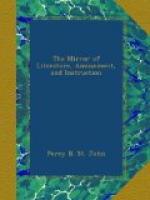* * * * *
Retrospective Gleanings.
* * * * *
CHILTERN HUNDREDS.
The three Hundreds of Desborough, Stoke, and Burnham, in Bucks, are called the “Chiltern Hundreds,” and take their name from the Chalk Hills which run through Bucks and the neighbouring counties. The property of these Hundreds remaining in the Crown, a Steward is appointed at a salary of 20_s_. and all fees, which nominal office is accepted by any Member of Parliament who wishes to vacate his seat.
* * * * *
PEG TANKARDS.
At Braintree and Booking, in Essex, when topers partake of a pot of ale, it is divided into three parts or draughts, the first of which is called neckum, the second sinkum, and the third swankum. In Bailey’s Dictionary, swank is said to be “that remainder of liquor at the bottom of a tankard, pot, or cup, which is just sufficient for one draught, which it is not accounted good manners to divide with the left-hand man, and according to the quantity is called either a large or little swank.”
* * * * *
CHIMNEYS.
Has the precise period been ascertained when chimneys upon the present mode were first constructed in England? It was apparently not sooner than Henry the Eighth’s time; for Leland, when he visited Bolton Castle, in Yorkshire, seems to have been greatly surprised by the novelty and ingenuity of the contrivance. “One thing (says he) I much notyd in the haull of Bolton, how chimneys was conveyed by tunnills made in the sydds of the waulls, betwixt the lights; and by this meanes is the smoke of the harthe wonder strangely convayed.”
The front of St. John’s Hospital at Lichfield, presents one of the most curious ancient specimens extant of this part of our early domestic architecture. This building was erected 1495, but it is possible that the remarkable chimneys may have been subsequently added.
* * * * *
OLD LONDON.
(For the Mirror.)
In a collection of Epigrams written by Thomas Freeman, of Gloucestershire, and published in 1014, is the following, entitled “London’s Progresse:”—
“Why, how nowe, Babell, whither
wilt thou build?
I see old Holbourne, Charing
Crosse, the Strand,
Are going to St. Giles’s in-the-field,
Saint Katerne, she takes Wapping
by the hand,
“And Hogsdon will to Hygate ere’t
be long,
London has got a great way
from the streame,
I thinke she means to go to Islington,
To eate a dish of strawberries
and creame.
The City’s sure in progresse I surmise,




